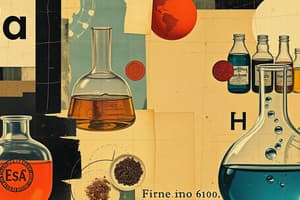Podcast
Questions and Answers
What characteristic is associated with metals?
What characteristic is associated with metals?
- Many are gases at room temperature
- Valence electrons are held tightly
- Have luster (correct)
- Tend to gain electrons
What do nonmetals tend to do with electrons?
What do nonmetals tend to do with electrons?
Gain electrons
Nonmetals are usually gases at room temperature.
Nonmetals are usually gases at room temperature.
False (B)
What is a characteristic of metalloids?
What is a characteristic of metalloids?
What does it mean if a metal is malleable?
What does it mean if a metal is malleable?
What is a characteristic of some metalloids?
What is a characteristic of some metalloids?
What is true about metals in terms of heat and electricity?
What is true about metals in terms of heat and electricity?
How are valence electrons held in nonmetals?
How are valence electrons held in nonmetals?
All metals are solid at room temperature.
All metals are solid at room temperature.
What does ductile mean concerning metals?
What does ductile mean concerning metals?
What is a characteristic of nonmetals?
What is a characteristic of nonmetals?
How are valence electrons held in metals?
How are valence electrons held in metals?
Metals tend to ______ electrons.
Metals tend to ______ electrons.
What characteristic do metalloids share with metals?
What characteristic do metalloids share with metals?
What is a characteristic of nonmetals in terms of conductivity?
What is a characteristic of nonmetals in terms of conductivity?
Nonmetals are typically shiny.
Nonmetals are typically shiny.
Flashcards are hidden until you start studying
Study Notes
Characteristics of Metals, Nonmetals, and Metalloids
- Metals exhibit luster, giving them a shiny appearance.
- Nonmetals tend to gain electrons during chemical reactions.
- Many nonmetals exist as gases at room temperature, highlighting their variability in physical states.
- Metalloids possess characteristics of both metals and nonmetals, making them versatile elements.
- Metals are malleable, allowing them to be shaped easily without breaking.
- Some metalloids function as semiconductors, bridging the gap between conductors and insulators.
- Metals are excellent conductors of heat and electricity due to their free-moving electrons.
- Nonmetals have tightly held valence electrons, resulting in different chemical properties compared to metals.
- With one exception (mercury), all metals are solid at room temperature, indicating their structural stability.
- Metals are also ductile, meaning they can be drawn into wires without breaking.
- Nonmetals are typically brittle, breaking or shattering easily under stress.
- Valence electrons in metals are held loosely, making them more reactive.
- Nonmetals generally tend to lose electrons when reacting, contrasting with nonmetals that typically gain them.
- Metalloids are good conductors of heat and electricity, but not to the extent of metals.
- Nonmetals serve as poor conductors of heat and electricity, limiting their utility in conductive applications.
- Nonmetals lack shine and are often described as not shiny in appearance compared to metals.
Studying That Suits You
Use AI to generate personalized quizzes and flashcards to suit your learning preferences.




